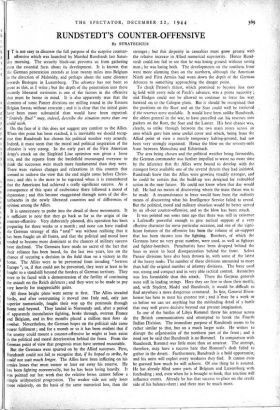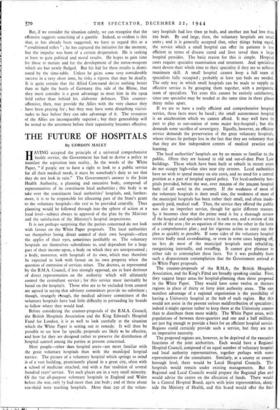RUNDSTEDT'S COUNTER-OFFENSIVE
By ST RAT EG ICUS
T is not easy to discover the full purpose of the surprise counter- ! offensive which was launched by Marshal Rundstedt last Satur- day morning. The security black-out prevents us from gathering even the essential facts about its development. It is known that the German penetration extends at least twenty miles into Belgium in the direction of Malmedy, and perhaps about the same distance towards Bastogne in Luxemburg. The advance has not been so great as this, as I write ; but the depth of the penetration into these recently liberated territories is one of the factors in the offensive that must be borne in mind. It is also apparently true that the elements of some Panzer divisions are milling round in the Eastern Belgian forests without restraint ; and it is clear that the initial gains have been more substantial than would have been expected. "Entirely fluid" may, indeed, describe the situation more than one could wish.
On the face of it this does not suggest any comfort to the Allies. When this point has been reached, it is inevitable we should recog- nise that Rundstedt has chosen his political weather very astutely. Indeed, it must seem that the moral and political inspiration of the offensive is very strong. In the early part of the First American Army's attack on the Siegfried Line optimism was given a loose rein, and the reports from the battlefield encouraged everyone to think the successes were much more fundamental than they were. There were various changes and relaxations in this country that seemed to endorse the view that the end might come before Christ- mas ; and this is the more to be regretted when it is remembered that the Americans had achieved a really significant success. As a consequence of this spate of exuberance there followed a mood of depression ; and this became exaggerated through news of the dis- turbanCes in the newly liberated countries and of differences of opinion among the Allies.
It is unnecessary to probe into the detail of these movements. It is sufficient to note that they go back as far as the origin of the counter-offensive. Very elaborately planned, this operation has been preparing for three weeks or a month ; and none can have studied the German strategy of this " total" war without realising that it has been fought on all fronts, and that the political and moral have tended to become more dominant as the chances of military success have declined. The Germans have made no secret of the fact that their reliance has been based, for the last two years, less on the chance of securing a decision in the field than on a victory in the home. The Allies were to be prevented from invading " fortress Europe"; or, if that could not be prevented, they were at least to be fought to a standstill beyond the borders of German territory. They were to be faced with a demonstration of the futility of continuing the assault on the Reich defences ; and they were to be made to pay very heavily for inappreciable gains.
All these bright plans went astray at first. The Allies invaded Sicily, and after overrunning it moved into Italy and, only just superior numerically, fought their way up the peninsula through Rome and beyond. They landed in Normandy and, after a period of apparently inconclusive fighting, broke through, overran France and Belgium, and in five months placed a million men hors de combat. Nevertheless, the German hopes on the political side came nearer fulfilment ; and for a month or so it has been evident that if the enemy could mount a counter-offensive he might at least assist in the political and moral deterioration behind the front. From the German point of view that prognosis must have seemed reasonable.
But the Germans were spurred on by the Allied successes. First, Rundstedt could not fail, to recognise that, if he hoped to strike, he could not wait much longer. The Allies have been inflicting on his armies losses that must sooner or later eat away his reserve. He has been fighting economically, but he has been losing heavily. It was pointed out last week that the relative losses cannot follow a simple arithmetical progression. The weaker side not only loses more relatively, on the basis of the same numerical loss, than the
stronger ; but this disparity in casualties must grow greater with the relative increase in Allied numerical superiority. Hence Rund- stedt could, not fail to see that he was losing ground without saving men ; he was losing both. The developments on the southern front were more alarming than on the northern, although the American Ninth and First Armies had worn down the depth of the German defences to something approaching the danger point.
To check Patton's thrust, which promised to become less easy
hold with every mile of Patch's advance, was a prime necessity ; and Hodges could not be allowed to continue to force his way forward on to the Cologne plain. But it should be recognised that the positions on the Roer and on the Saar could well he retrieved if the reserves were available. It would have been unlike Rundstedt, the ablest general in the war, to have parcelled out his reserves into packets on the Roer, the Saar and the Lauter. His best chance was, clearly, to strike through between the two main zones across an area which gave him some useful cover and which, being from the Allied point of view a merely temporary halting-ground, had not been very strongly organised. Hence the blow on the seventy-mile front between Monschau and Echternach.
The area being chosen and the political weather being favourable, the German commander was further impelled to waste no more time by the inference that the Allies were bound to develop with the strongest force available one of the several thrusts they had initiated. Rundstedt knew that the Allies were growing steadily stronger, and he could be certain that the build-up was designed for redoubled action in the near future. He could not know when that day would fall. He had no means of discovering where the main thrust was to be made. A reconnaissance in force would have been the ordinary means of discovering what his Intelligence Service failed to reveal. But the political, moral and military situation would be better served by an all-out counter-offensive, and so the blow has been struck.
It was pointed out some time ago that there was still in existence a Luftwaffe powerful enough to give tactical support of a very effective character for some particular occasion, and one of the signi- ficant features of the offensive has been the volume of air-support that has been thrown into the fighting. Bombers, of which the Germans have no very great number, were used, as well as fighters and fighter-bombers. Parachutists have been dropped behind the lines to assist in local disorganisation behind the front. Select Panzer divisions have also been thrown in, with some of the latest of the heavy tanks. The number of these divisions amounted to more than half the original number of infantry divisions. The force used was strong and compact and in very able tactical control. Avranches was less formidable than this attack. There the German generals were still in leading strings. Here they are free to show their mettle, and, with Student, Model and Rundstedt, it would be difficult to find anywhere a more dangerous command. In fine, General Eisen- hower has here to meet his greatest test ; and it may be a week or so before we can see anything but the misleading detail of a battle that may well prove decisive beyond our present imagination.
In one of the battles of Libya Rommel threw his armour across the British communications and attempted to break the Fourth Indian Division. The immediate purpose of Rundstedt seems to be rather similar to that, but on a much larger scale. He wishes to disrupt the organisation of the northern part of the front ; and it need not be said that Rundstedt is no Rommel. In comparison with Rundstedt, Rommel was little more than an amateur. The attempt, therefore, may have a success here that Rommel's dash failed to gather in the desert. Furthermore, Rundstedt is a bold opportunist, and his units will exploit every weakness they find. It cannot even be guessed how much he will achieve. Of one thing he is assured. He has already filled some parts of Belgium and Luxemburg with foreboding ; and, even when he is brought to book, that reaction will influence events. Already he has that success to place on the credit side of his balance-sheet ; and there may be much more. But, if we consider the situation calmly, we can recognise that the offensive suggests something of a gamble. Indeed, so evident is this that, as has already been suggested, we have to regard this as a " conditioned reflex " ; he has captured the initiative for the moment, but the impulse was born of a certain desperation. He is seeking at least to gain political and moral results. He hopes to gain time for those to mature and for the development of the terror-weapons which are but newly fledged. But his bid for these results is domi- nated by the time-table. Unless he gains some very considerable success in' a very short time, he risks a riposte that may be deadly. It is quite certain that the Allied Command des:re nothing better than to fight the battle of Germany this side of the Rhine, that they must consider it a great advantage to meet him in the open. field rather than behind his elaborate defences. This counter- offensive, then, may provide the Allies with the very chance they
• have been praying for ; but they may have some disturbing vicissi- tudes to face before they can take advantage of it. The resources of the Allies are incomparably superior ; but their generalship will be tested to the uttermost before their superiority becomes effective.



























 Previous page
Previous page